|
|
|
Sort Order |
|
|
|
Items / Page
|
|
|
|
|
|
|
| Srl | Item |
| 1 |
ID:
187090
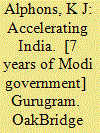

|
|
|
|
|
| Publication |
Gurugram, OakBridge Publishers Pvt Ltd, 2021.
|
| Description |
xvii, 338p.hbk
|
| Standard Number |
9789391032548
|
|
|
|
|
|
|
|
|
|
|
|
Copies: C:1/I:0,R:0,Q:0
Circulation
| Accession# | Call# | Current Location | Status | Policy | Location |
| 060226 | 954.0533/ALP 060226 | Main | On Shelf | General | |
|
|
|
|
| 2 |
ID:
094616


|
|
|
|
|
| Publication |
London, Earthscan, 2009.
|
| Description |
xxvi, 397p.
|
| Standard Number |
9781844077458
|
|
|
|
|
|
|
|
|
|
|
|
Copies: C:1/I:0,R:0,Q:0
Circulation
| Accession# | Call# | Current Location | Status | Policy | Location |
| 054865 | 363.61/BIC 054865 | Main | On Shelf | General | |
|
|
|
|
| 3 |
ID:
146644


|
|
|
|
|
| Summary/Abstract |
The Africa Day 2015 Symposium provided a unique opportunity to develop glocal networks among activists, learners, scholars, researchers, and community members based in central Canada and other parts of the world. The Symposium examined a wide range of scholarship on Africa including calls for ending oppression based on sexual identity, greater policy responses to health, gender, and human security challenges, improving governance of natural resources, and investigating the prospects for glocal networks. While this scholarship stressed the need for Afro-optimism, it also drew attention to on-going human security challenges faced by many across the continent. This article builds upon the momentum from the Symposium by amplifying the voices of African scholars and enhancing mentorship, emphasizing greater cooperation among researchers and communities based inside and outside Africa, and defeating misconceived allusions to Afro-pessimism. Based on critical scholarship, the article also highlights innovative governance insights that are adapted to specific situations across Africa.
|
|
|
|
|
|
|
|
|
|
|
|
|
|
|
|
| 4 |
ID:
170175
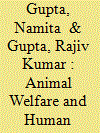

|
|
|
|
|
| Summary/Abstract |
India’s large stray dog population, estimated to be about 25 million, poses substantial risks to human health, motivating some civic bodies to employ cruel methods to control dog populations. This article argues that while human health is certainly a priority, it is also important to consider animal welfare and to handle dog population control measures without causing unnecessary animal suffering. Triangulating the issues of rabies control, dog population management and state intervention, the article identifies recent practical difficulties in local management of dog population control laws and policies in India’s model city of Chandigarh. Based on a survey of local opinions, this shows how rising human–animal conflicts require new ways of handling existing challenges.
|
|
|
|
|
|
|
|
|
|
|
|
|
|
|
|
| 5 |
ID:
106704
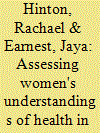

|
|
|
| 6 |
ID:
143667
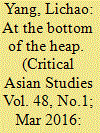

|
|
|
|
|
| Summary/Abstract |
This article explores the health, disease and socioeconomic circumstances of garbage collectors in Guiyang, southwestern China. It aims to contribute to medical anthropology and understandings of Chinese society by examining garbage collectors’ understandings of waste picking, pollution and the health risks and diseases associated with their struggles for survival at the “bottom of the heap” of peri-urban society in contemporary China. Drawing on one month of ethnographic fieldwork, it provides new insights into the oft-neglected subjectivity of individuals struggling for survival at the margins of Chinese society, and how this subjectivity is shaped by their structural position as well as by their own agency in making sense and making the best of their lives.
|
|
|
|
|
|
|
|
|
|
|
|
|
|
|
|
| 7 |
ID:
179262
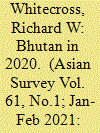

|
|
|
|
|
| Summary/Abstract |
The year 2020 in Bhutan was dominated by the coronavirus pandemic, a decline in state revenues, and territorial claims by China. In 2019, Bhutan’s strong economy suggested that the country would graduate from the least developed country category in 2023. The economic impact of the coronavirus pandemic on the economy makes this less certain.
|
|
|
|
|
|
|
|
|
|
|
|
|
|
|
|
| 8 |
ID:
097321


|
|
|
| 9 |
ID:
131230
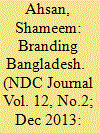

|
|
|
| 10 |
ID:
129896


|
|
|
| 11 |
ID:
095832
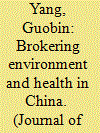

|
|
|
|
|
| Publication |
2010.
|
| Summary/Abstract |
This article identifies four types of issue entrepreneurs in the creation of public issues about the environment and health in China. They are media professionals, environmental and health NGOs, villagers, and netizens. Because of the different resources of issue entrepreneurs and the constraints of China's political context, politically safe and innocuous issues and issues of concern to the urban population are more likely to enter the public sphere. Contentious issues linked to the interests of powerful business and political actors may become publicized under extraordinary circumstances such as emergencies, disasters, or epidemics, suggesting that external shocks may have a galvanizing effect. Some environment-related health issues, such as pollution-related cancer, are high-stake issues. They often affect the most disadvantaged segments of the Chinese population, yet despite their gravity, their chances of entering the public sphere are small.
|
|
|
|
|
|
|
|
|
|
|
|
|
|
|
|
| 12 |
ID:
187986


|
|
|
|
|
| Summary/Abstract |
This study analysed the short- and long-term impacts of fiscal consolidation on social sector spending in Indian economy and thereby on human capital. Using autoregressive distributed lag framework, the study found that fiscal adjustments have significant potential to undermine the short- and long-run spending in human capital. A fiscal adjustment aimed at strengthening fiscal position of the Indian economy can have adverse impacts on the growth rate of income. Lower-income growth will imply increased constraint on part of the government to spend in public utilities like education and health. Similarly, a fiscal adjustment based on slashing government spending can adversely impact both short- and long-term welfare spending as these spendings are mainly financed by deficits. The policymakers while framing the design of a consolidation programme need to take extra precaution as far as the composition of these adjustments are concerned. Moreover, there is need of legislate aimed at changing the nature of welfare spending from discretionary to compulsory.
|
|
|
|
|
|
|
|
|
|
|
|
|
|
|
|
| 13 |
ID:
167033
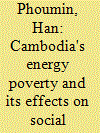

|
|
|
|
|
| Summary/Abstract |
This study aims to quantify the incidence of energy poverty in Cambodia and its potential impact on the social wellbeing of the people of Cambodia. The notion of energy poverty of a household is not well understood in the context of literature as it may refer to either ‘energy poor’ or ‘economically poor’ condition of the household. This study defines energy poverty in terms of lack of accessibility and/ or affordability of energy, which may cause the deprivation of a household and affect its wellbeing. The study uses the latest Cambodia Socio-Economic Survey Data 2015 (CSES 2015) to investigate the impacts of energy poverty on the health, education and earning opportunities of the households. The findings of the study suggest that energy poverty of a household is strongly associated with the type of fuel used and low consumption of unaffordable clean energy by the household. The resulting impacts of energy poverty on the wellbeing of households are enormous. Energy poor households have a higher probability of its members suffering from respiratory problems, spending more on medical care, having a higher dropout rate from schools and lower earning opportunities than the households without energy poverty. Based on its findings, the study suggests an urgent need of policy measures focusing on provision of clean and affordable energy to poor households to reduce / eliminate energy poverty in Cambodia.
|
|
|
|
|
|
|
|
|
|
|
|
|
|
|
|
| 14 |
ID:
125602


|
|
|
|
|
| Publication |
2013.
|
| Summary/Abstract |
Despite considerable quantitative case study research on communities living with turbines, few have studied the roles played by the perceptions of: health risk, economic benefits/fairness, and intra-community conflict. We report the findings from a case-control survey which compares residents living with/without turbines in their community to understand the relative importance of these variables as predictors of turbine support. Ontario is the context for this study as it is a place where the pace of turbine installations is both very high and extremely politicized. As expected 69% of residents in the case community would vote in favour of local turbines yet surprisingly, only 25% would do so in the control community. Though the literature suggests that aesthetic preferences best predict turbine support the key predictors in this study are: health risk perception, community benefits, general community enhancement, and a preference for turbine-generated electricity. Concern about intra-community conflict is high in both the case (83%) and control (85%) communities as is concern about the fairness of local economic benefits (56% and 62%, respectively); yet neither is significant in the models. We discuss the implications of these findings particularly in terms of the consequences of a technocratic decide-announce-defend model of renewable facility siting.
|
|
|
|
|
|
|
|
|
|
|
|
|
|
|
|
| 15 |
ID:
101155
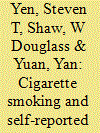

|
|
|
|
|
| Publication |
2010.
|
| Summary/Abstract |
The effect of cigarette smoking on self-reported or assessed health (SAH) has been considered in several studies, with some surprising results, but smoking behavior has received less attention in studies in countries like China, than in the United States and various European countries. In this manuscript the variation in an ordinal endogenous SAH variable is modeled with an ordinal endogenous cigarette smoking variable, using the copula approach to accommodate skewness in the error distribution. The treatment approach avoids several selection issues that could bias empirical estimates. The empirical model is estimated for a random sample of adult males from nine Chinese provinces in the 2006 China Health and Nutrition Survey. The results for our sample suggest that heavy smokers are more likely to report excellent health. Government and those in health policy might target heavy smokers with the message that quitting does result in benefits, keeping in mind that their own reported assessment of their health is itself a function of several factors.
|
|
|
|
|
|
|
|
|
|
|
|
|
|
|
|
| 16 |
ID:
122430
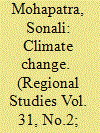

|
|
|
| 17 |
ID:
141252
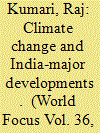

|
|
|
|
|
| Summary/Abstract |
Climate change is one of the main environmental challenges facing the world today. India is facing several problems. Climate change is associated with various adverse impacts on agriculture, water resources, forest and biodiversity, health, coastal management and increase in temperature Climate change would represent additional stress on the ecological and socioeconomic systems that are already facing tremendous pressure due to rapid industrialization, urbanization and economic development. This paper analyzes the efforts made by government of India to reduce the environmental challenges.
|
|
|
|
|
|
|
|
|
|
|
|
|
|
|
|
| 18 |
ID:
097666
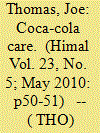

|
|
|
| 19 |
ID:
139444
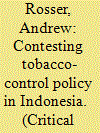

|
|
|
|
|
| Summary/Abstract |
Over the past decade and a half, the Indonesian government has progressed fitfully and inconsistently toward a stricter tobacco-control policy regime, albeit without much impact on the country's worsening tobacco epidemic. This article explains this pattern of reform in terms of the unequal but changing relationship of power between tobacco companies and tobacco farmers, on the one hand, and tobacco-control advocates based in NGOs, health professional organizations, universities, and international organizations, on the other. The first of these coalitions has had greater structural leverage, better political connections, stronger organizational capacity, greater ability to mobilize popular forces, and more capacity to cultivate a positive public image. But the second coalition has been able to exercise some influence over policy because of changes wrought by democratization. In this analysis, the author engages with the literatures on (1) Indonesia's political economy in the post–New Order period and (2) the politics of tobacco control in developing countries. With regard to the former, the author argues that we need to give greater attention to the role of actors previously excluded from the policy-making process than is currently the case. With regard to the latter, the author contends that more focus is needed on domestic actors and political institutions in shaping tobacco-control policy. Looking to the future, the author suggests that further progress in Indonesia's tobacco-control policies will be contingent upon an ongoing process of struggle; however, there are signs that the tide is turning in favor of the second coalition.
|
|
|
|
|
|
|
|
|
|
|
|
|
|
|
|
| 20 |
ID:
119894
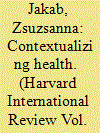

|
|
|
|
|
| Publication |
2012.
|
| Summary/Abstract |
Dr. Margaret Chan, Director General of the World Health Organization, begins her foreword to the 2010 WHO/HABITAT report Hidden Cities:
"It is well known by now that half of humanity lives in urban areas - and the proportion is growing. Cities, with their concentration of culture, infrastructure, and institutions have long driven the progress of civilization and have been the focus of opportunity and prosperity."
|
|
|
|
|
|
|
|
|
|
|
|
|
|
|
|
|
|
|
|
|